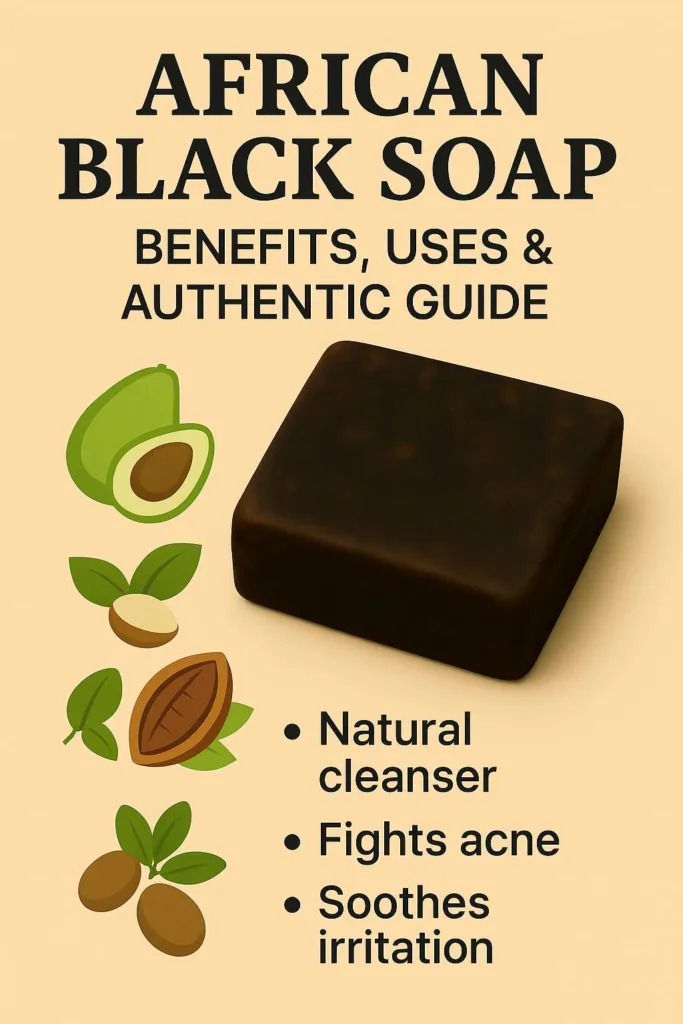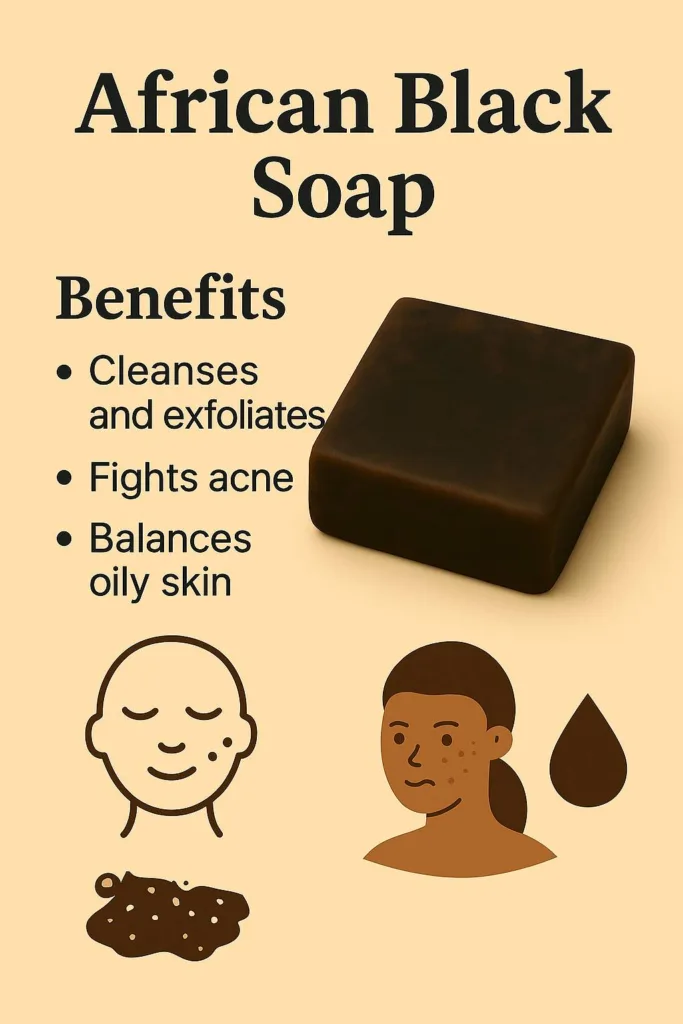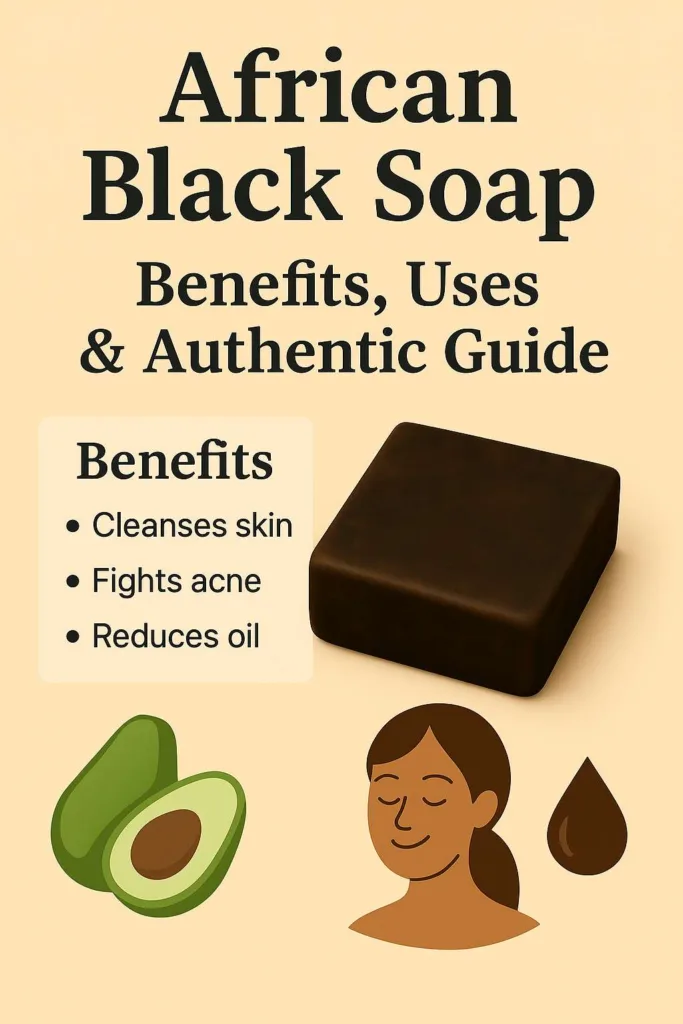When I first unwrapped my first bar of authentic African black soap three years ago, I was honestly surprised. The crumbly, uneven texture looked nothing like the smooth commercial bars I was used to. It had an earthy, almost smoky scent that reminded me of charcoal fires. After my first wash, my skin felt incredibly clean—almost too clean—with a slight tightness that made me reach for moisturizer immediately.

What Is Black Soap?
Black soap, specifically African black soap, is a traditional cleansing bar made from plant-based ingredients that have been used in West Africa for centuries. Unlike modern commercial soaps or charcoal-infused bars that are simply dyed black, authentic African black soap gets its dark color naturally from ash made by burning plantain skins, cocoa pods, and other plant materials.
The confusion around “black soap” comes from marketing—many products labeled as black soap are actually charcoal soaps, glycerin bars with black dye, or liquid cleansers. True African black soap has a distinctive crumbly texture, uneven brown-to-black coloring, and contains no synthetic ingredients or artificial colors.
Origins & Traditional Ingredients
African black soap originates from West African countries, particularly Ghana, Nigeria, and Benin, where it’s been crafted by artisans for generations. The core ingredients typically include:
- Plantain skins and leaves: Provide potassium and natural enzymes
- Cocoa pod ash: Creates the alkaline base for saponification
- Palm kernel oil: Adds moisturizing properties and creates lather
- Coconut oil: Contributes to cleansing power
- Shea butter: Offers conditioning benefits
- Palm oil: Provides hardness and stability
What matters to me about these origins is the artisan craftsmanship and the fact that purchasing authentic black soap often supports fair trade cooperatives and women’s collectives in West Africa. There’s something meaningful about using a product that hasn’t changed its formula for hundreds of years and directly benefits the communities that perfected it.
Types of “Black Soap”: African vs. Charcoal
Not all black soaps are created equal. Here’s how to spot the differences:
- Texture: Authentic African black soap is soft, crumbly, and uneven vs. hard, smooth commercial bars
- Ingredients: Real black soap lists plant ashes and traditional oils vs. charcoal powder, synthetic fragrances, and sulfates
- Packaging: Often comes in simple wrapping with fair trade certification vs. flashy marketing with “activated charcoal” claims
I learned this the hard way when I bought what I thought was black soap from a big-box store. The perfectly molded black bar with “charcoal detox” claims lathered purple and left my skin feeling stripped. The ingredient list read like a chemistry experiment. That’s when I realized the difference between authentic craft and marketing gimmicks.
Benefits of Black Soap for Skin & Scalp
Commonly Reported Benefits:
- Deep cleansing without harsh sulfates
- Gentle exfoliation from natural plant fibers
- Oil control for acne-prone areas
- Scalp cleansing to remove product buildup
- May help with body acne and ingrown hairs
Don’t Expect Miracles:
- Won’t cure severe acne or skin conditions
- Results vary greatly between individuals
- Not a replacement for medical treatment
Personally, I noticed fewer breakouts on my back and chest after using black soap for body washes, and it effectively removed styling product buildup from my scalp. However, it didn’t dramatically change my facial skin, and I still needed my regular acne treatments.
Side Effects, pH & Who Should Avoid It
Black soap can be quite alkaline (pH 9-10), which means it’s more cleansing but potentially more irritating than modern pH-balanced cleansers. Possible downsides include:
- Dryness and tightness, especially with overuse
- Irritation for sensitive skin or conditions like eczema
- Color transfer that can stain light fabrics
- Fragrance sensitivities from natural plant materials
Who should be cautious: People with very sensitive skin, active eczema, or compromised skin barriers should patch test first or consider milder alternatives.
I learned this lesson when I started using black soap twice daily on my face during my first month. My skin became tight and slightly irritated. Now I use it 2-3 times per week and always follow with a good moisturizer, which solved the problem completely.
How to Use Black Soap
For Face:
- Wet your hands and create a lather with the soap (don’t rub directly on face)
- Apply lather gently, avoiding eye area
- Rinse quickly and thoroughly
- Follow immediately with moisturizer
- Start with 2-3 times per week for oily skin, once weekly for dry skin
For Body:
- Lather in hands or use a soap bag to contain crumbly pieces
- Apply to wet skin, focusing on oily areas
- Rinse well to prevent residue
- Use daily if tolerated, or alternate with gentler cleansers
For Hair/Scalp:
- Work lather into wet scalp, avoiding lengths
- Massage gently for 1-2 minutes
- Rinse thoroughly
- Always follow with conditioner
- Use weekly or biweekly for buildup removal
Pro Tip: I cut my black soap bar into small cubes and store them in a dry container. This prevents the whole bar from getting mushy and makes it easier to grab just what I need for each use.

How Black Soap Is Made
Traditional African black soap production is a time-honored process that takes several weeks:
- Preparation: Plant materials (plantain skins, cocoa pods, palm fronds) are sun-dried for days
- Burning: Dried materials are roasted in clay ovens until they become ash
- Filtering: Ash is mixed with water and filtered to create lye
- Saponification: Lye is combined with oils and butters (palm, coconut, shea) and hand-stirred for hours
- Curing: The mixture is poured into molds and left to cure for weeks until it hardens
This process creates the soap’s characteristic brown-black color and crumbly texture. The long curing time allows excess lye to neutralize, though the final product remains more alkaline than commercial soaps.
Buying Guide: Authentic vs. Imitation
6-Point Authenticity Checklist:
- Ingredient list shows plant ashes and traditional oils (no sulfates or synthetic detergents)
- Texture is soft, crumbly, and uneven (not perfectly molded)
- Color varies from brown to black with natural mottling
- Fair trade or artisan cooperative certification
- Reasonable price ($8-15 per bar, not $2 or $50)
- Origin clearly stated as West African
Red flag experience: I once bought “authentic black soap” online that arrived as perfectly smooth, jet-black bars with no ingredient list. They smelled like artificial fragrance and lathered bright purple.
Green flag I now look for: Uneven texture, visible plant fibers, and packaging that tells the story of the cooperative or artisan who made it.
DIY African Black Soap Recipe (Beginner-Friendly)
For safety, I recommend starting with pre-made African black soap base rather than handling lye:
Ingredients:
- 4 oz raw African black soap base (purchased)
- 2 tbsp distilled water
- 1 tsp honey (optional)
- 5-10 drops essential oils (optional)
Steps:
- Grate or chop the soap base into small pieces
- Melt gently in double boiler with distilled water
- Remove from heat, add honey and essential oils
- Pour into silicone molds
- Let cure for 24-48 hours before unmolding
- Store in airtight container away from moisture
Safety note: Always wear gloves when handling raw black soap base, as it can be alkaline.
My favorite essential oil blend is 3 drops tea tree and 2 drops lavender—the tea tree adds antimicrobial properties while lavender balances the earthy scent.
Black Soap vs. Regular Soap vs. Syndet Bars
| Product Type | Cleansing Strength | Gentleness | Scent | Price | Best For |
| African Black Soap | High | Medium | Earthy/Natural | $$ | Oily skin, body acne |
| Charcoal Soap | Medium-High | Low-Medium | Often fragranced | $ | Oily skin (commercial option) |
| Regular Soap | Medium | Medium | Varied | $ | Daily use, all skin types |
| Syndet Bar | Low-Medium | High | Often fragranced | $$$ | Sensitive/dry skin |
What I reach for and when: Black soap for my weekly scalp detox and summer body washes when I’m more oily. Regular gentle soap for daily face cleansing. Syndet bars during winter when my skin needs extra care.
My 30-Day Results & Honest Takeaways
Week 1: Immediate tightness after washing, needed extra moisturizer. Skin felt very clean but slightly overdried.
Week 2: Adjusted to using every other day instead of daily. Noticed fewer blackheads on my nose and less oily T-zone by evening.
Week 3: Back and chest acne started clearing up noticeably. Found my sweet spot using it 3x per week on face, daily on body.
Week 4: Skin texture improved overall, fewer ingrown hairs on legs, scalp felt cleaner longer between washes.
Honest verdict: Black soap works well for oily, acne-prone skin when used correctly, but it’s not a miracle cure. It’s best viewed as a deep-cleaning treatment rather than daily gentle care. I’d recommend it to people with oily skin, body acne, or those wanting a natural cleansing option, but not to anyone with very sensitive or dry skin.
Frequently Asked Questions
Is black soap good for acne-prone skin? Yes, its deep cleansing properties can help with mild acne, especially on the body. However, it shouldn’t replace medical acne treatments for severe cases. Start slowly to avoid over-drying.
Can I use black soap every day? Some people can, but most do better with 2-4 times per week. Daily use often leads to dryness and irritation, especially on the face.
Will black soap lighten or darken skin? Authentic African black soap doesn’t lighten or darken skin permanently. Any temporary changes are usually from removing dead skin cells and improving circulation.
Is it safe for color-treated hair? Use cautiously, as its alkaline nature can fade color treatments. Limit to once monthly for clarifying, and always deep condition afterward.
How do I store black soap so it doesn’t melt? Keep it in a dry, well-ventilated area away from direct water contact. I store cut pieces in a container with holes for airflow.

Conclusion: Is Black Soap Worth It?
If you have oily, acne-prone skin and want a natural, traditional cleansing option, authentic African black soap is worth trying. It’s particularly effective for body acne, scalp buildup, and deep cleansing. However, skip it if you have very sensitive or dry skin, or if you prefer gentle daily cleansers.
My final take after three years of use: it’s a valuable addition to my skincare arsenal, but not my only cleanser. The key is respecting its strength, starting slowly, and always moisturizing afterward. Most importantly, patch test first and listen to your skin—not every traditional remedy works for every person, and that’s perfectly fine.
Always patch test new skincare products on a small area for 24-48 hours before full use. Discontinue if irritation occurs.